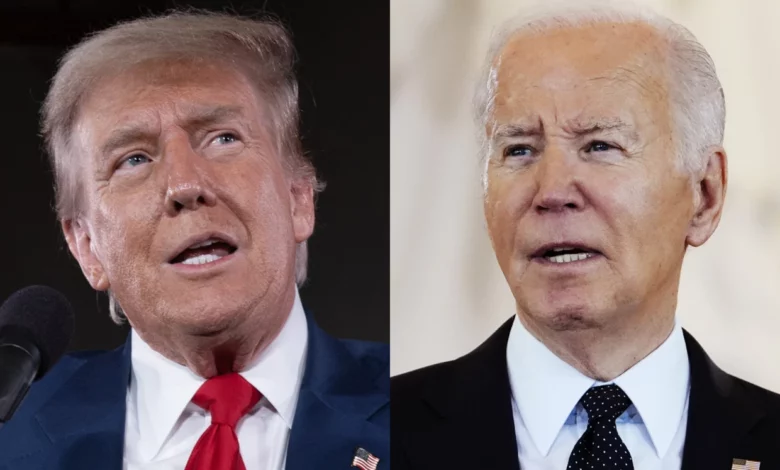Trump and Biden hone their messages ahead of the first debate and stretch run
Some strategists say the candidates are talking too much about the past and not enough about the future.

A little more than a month before they meet on a debate stage and less than six months before voters go to the polls, President Joe Biden and former President Donald Trump are clarifying their overarching messages to voters.
“This is a choice between a candidate who cares about you and a candidate who cares about himself,” Biden pollster Molly Murphy said. “All roads lead back to that core framing.”
Chris LaCivita, a senior adviser to Trump, said the race is about “strength vs. weakness” and “success vs. failure.”
Articulating a central theme is just a piece of the strategy that goes into running billion-dollar modern campaigns. When done well, it provides an organizing principle for the campaign and gives voters a main lens for seeing how the candidate’s record, conduct and promises add up to a vision for the future, according to veteran political operatives.
“Often the winning political campaign is the one that successfully defines the question that the voter is answering with her vote,” Republican strategist Brad Todd said. “In a race where both candidates are completely known, for all their faults and their strengths, it’s very difficult to do that.”
‘They don’t give a s— whether he cares about them’
Todd is one of a number of strategists in both parties who say Biden and Trump are both missing the mark with their messaging.
“The race is going to come down to which candidate makes people think they are more focused on the future,” he said. “Both of these candidates have a real problem getting out of the past.”
Democratic strategist Chris Kofinis, who has worked on past presidential campaigns, offered a variation on the same theme: that Trump and Biden should be more focused on Americans’ future than contrasting their personal traits.
“It’s about who you believe is going to do a better job over the next four years, given the challenges the country faces,” Kofinis said, offering a critique of Biden’s basic construct. “If they think Donald Trump is going to address inflation, they don’t give a s— whether he cares about them or not.”
Both candidates suffer from upside-down approval ratings, which suggest that they have not made themselves popular to this point in the campaign and that they may have credibility problems as messengers.
No one wants to throw good money at a bad message. If the candidates decide their messages aren’t landing, they could change them at any time.
Court TV and the air raid
Each campaign will pour hundreds of millions of dollars into communicating their main theme and related messages through rallies; media interviews; television, radio and digital ads; house-to-house door-knocking operations; and other voter-engagement tactics.
For the time being, Trump is running his messaging from a courthouse in New York, where he is on trial on charges that he falsified business records in order to help his 2016 campaign by covering up an alleged affair with porn actor Stormy Daniels.
That complicates his messaging in a couple of ways: His time on the campaign trail is circumscribed by court dates that typically allow for Wednesdays and weekends off, and his political defense against charges in four separate cases is that he is a victim of Biden’s “weaponizing” the judiciary against him. There’s no evidence that Biden is interfering in the criminal cases, and it would be a powerful president — not a weak one — who would be able to control prosecutors, grand juries and judges in several jurisdictions.
His team believes that he’s demonstrated an ability to command attention from the media and voters in a fashion unlike any previous candidate, and aides say his campaign and his endorsers follow his lead.
“Our messaging operation starts with Trump,” Trump campaign spokeswoman Danielle Alvarez said. “He is our best asset — the political operation in the battleground states, the massive surrogate operation, the media strategy all supplement him.”
In addition to addressing the media outside the courtroom, Trump has been able to hold rallies and fundraisers in battleground states during the trial. And he has kept up a cadence of several local media interviews in swing states in recent weeks, ensuring that voters hear from him even when he is not physically in their states.
His campaign has not expanded its footprint in battleground states with the speed that the better-funded Biden operation has, nor has it attempted to match the tens of millions of dollars the Biden camp has spent on the airwaves in recent weeks. But Biden’s heavier spending has not resulted in any clear movement in the polls in his favor.
Trump aides say the air and ground games will pick up over the summer and that they are confident voters will remember that Trump started no wars and that the economy during his presidency was strong before the Covid-19 pandemic brought commerce to a halt.
“It’s getting back to basics,” Alvarez said. “There is no secret sauce. Americans just want to know that they can provide for their families. And they were able to do that under Trump.”
Ground-pounders
Biden aides describe an “all of the above” messaging strategy as the key to positioning the president for re-election.
“It’s impossible to break through on any single platform,” said one Biden campaign aide who works in swing states. The aide detailed a layered approach to driving home the main contrasts by talking to voters directly, deploying influencers and community leaders online, advertising, and having Biden travel to swing states.
“Those tactics validate and make authentic to people what they see on TV,” the aide said, adding that a presence on the ground is crucial because “we expect that every battleground state … is going to be incredibly close.”
Biden’s air game includes trying to reach voters when they aren’t focused on politics, a strategy that has included running ads during the Kentucky Derby and the NBA playoffs, according to campaign spokesman Michael Tyler. In February, however, Biden notably passed up the opportunity to reach millions of voters by deciding to skip doing a Super Bowl interview.
One of the long-running frustrations for Biden’s White House and the campaign is the perception that he is presiding over a weakened economy. That’s part of the message that Trump is hammering, and there is some evidence that it has gained traction. But while consumer prices have soared since the pandemic hit, there are plenty of signs of health in the broader economy.
Biden is trying to bridge that gap with validators, like Washington, Pennsylvania, Mayor Joseph “JoJo” Burgess.
“I see jobs coming to the area. I see infrastructure being fixed up. I see those policies working,” Burgess said in an ad that began running in Pennsylvania last month. “Right now, we have the most pro-American-worker president in office that we’ve ever had in this country’s history. Donald Trump cares about one person and one person only, and that’s Donald Trump.”
Biden aides say the president has a strong record of accomplishment on items like adding jobs to the economy, reducing the price of insulin for Medicare recipients and signing gun-safety legislation.
“I think they have a pretty weak candidate right now,” Tyler said of Trump, pointing to his time off the campaign trail even when he’s not in court. “Instead of going out and facing voters, he was at Mar-a-Lago hawking NFTs.”




